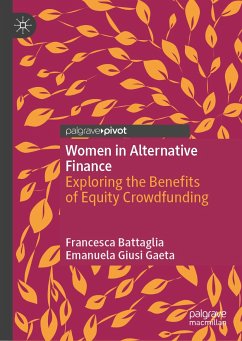
Banking and Beyond (eBook, PDF)
The Evolution of Financing along Traditional and Alternative Avenues
Redaktion: Cruciani, Caterina; Cavezzali, Elisa; Gardenal, Gloria
Versandkostenfrei!
Sofort per Download lieferbar
72,95 €
inkl. MwSt.
Weitere Ausgaben:

PAYBACK Punkte
36 °P sammeln!
Addresses the impact of recent normative changes on the banking sector, looking at systemic effects and at the ensuing incentives for institutional and individual investors
Deals with frontier topics in banking while discussing the role of alternative capital markets and new non-bank financing tools for the evolution of the financing landscape of SMEs
Investigates new trends and opportunities for the financing of SMEs and new ventures and the implications of financial choices for the survival of startups¿
Deals with frontier topics in banking while discussing the role of alternative capital markets and new non-bank financing tools for the evolution of the financing landscape of SMEs
Investigates new trends and opportunities for the financing of SMEs and new ventures and the implications of financial choices for the survival of startups¿
Dieser Download kann aus rechtlichen Gründen nur mit Rechnungsadresse in A, B, BG, CY, CZ, D, DK, EW, E, FIN, F, GR, HR, H, IRL, I, LT, L, LR, M, NL, PL, P, R, S, SLO, SK ausgeliefert werden.












